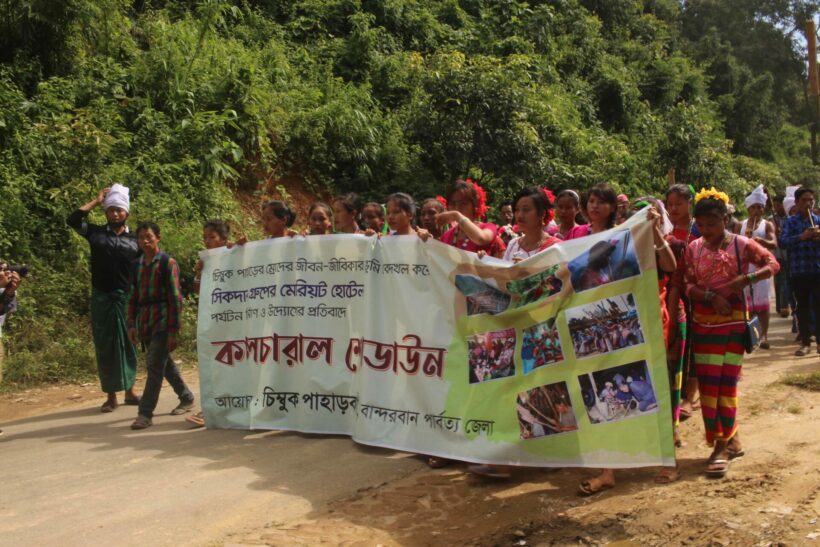People of the hill forest, an abode of the Mongoloid ethnic Adivasis refuse to celebrate the historic signing of the Chittagong Hill Tracts (CHT) Peace Accord on December 2, which brought to an end a protracted autonomy-seeking insurgency for more than two decades.
By Saleem Samad
However, the government is officially celebrating the silver jubilee of the Peace Accord. The government-sponsored supplements in mainstream newspapers failed to mention the implementation of the accord and instead runs a list of physical developments including how many solar-panel sets were distributed, roads and bridges were built and blah, blah.
On the other hand, the Parbatya Chattagram Jana Samhati Samiti (PCJSS) in a paid supplement in Dainik Samakal stated that in 25 years the peace accord has not been fully implemented, which remains a bone of contention among the ethnic communities in the hills.
Out of 72 provisions of the accord, only 25 provisions and 18 clauses have been partially implemented, said PCJSS supremo Jyotirindra Bodhipriya Larma a.k.a. Shantu Larma on the occasion of the 25th anniversary at Liberation War Museum auditorium which was not a surprise for many.
On the eve of the accord’s silver jubilee, a full-fledged Hill District Council in Rangamati, Khagrachari and Bandarban has not been formed through direct elections. The interim Hill District Councils were formed with hand-picked ruling party members, mostly Bangalee and a few Adivasis. This undemocratic and partisan path gives a wrong message to the hill people of a lack of political commitment.
The government remains silent when the implementation of the fundamental provisions of the accord was raised, which caused further complications.
Despite all odds, Shantu Larma seems hopeful that the accord will surely see the light of day before the ‘golden jubilee’ celebration. Then only the hill people will be able to celebrate the accord, he quipped.
Unless the peace accord, signed on 2 December 1997 during the first tenure of Sheikh Hasina’s government (1996-2001), peace will remain elusive for the Adivasis of the picturesque hills.
In the last quarter century, the CHT Peace Accord Implementation Committee has held its 6th meeting recently. This also gives an impression of the seriousness of the government’s will. On the other side, the CHT Land Commission formed under the provision of the CHT Accord has not progressed at all.
Nevertheless, Shantu Larma seems to have faith in Prime Minister Sheikh Hasina, who he said has the sincere political will to get the peace deal signed and a bill passed in the parliament.
He argued that the responsibility to implement the peace accord lies with the state and nobody else, not PCJSS.
A road map to implement the accord to achieve peace was also agreed upon with the government. It was not understood what hindered the delay in the implementation of the accord.
The peace process for a solution with the government’s liaison committee had been initiated during the military junta of General H M Ershad. Later when Khaleda Zia’s Bangladesh Nationalist Party (BNP) came to power, the dialogue with the government continued and the end result was zero.
Both regimes experienced hiccups as the liaison committees could not envisage a political solution to the crisis.
When Sheikh Hasina came to power in 1996, a year later a rapid series of dialogues resulted in the CHT Peace Accord after the government recognised the crisis as a political problem.
The CHT Peace Accord was written with the supreme sacrifice of the blood of the Adivasis and the political vision of the Awami League government.
“We are continuing the dialogue to achieve peace,” PCJSS supremo said.
In frustration, Shantu Larma remarked that: “It does not take 25 years to implement a peace accord.”
Most people in Bangladesh, especially those visiting the hill forests as a tourist are not aware that martial law has long gone away with the fall of a dictator in 1990, a de facto military rule continues, and ‘Operation Uttaran’ has not been withdrawn, even though it was agreed in the accord to stop targeting the hill people.
The military dictator General Ziaur Rahman deliberately wanted to Islamise CHT and pushed tens of thousands of landless Bangalee Muslim settlers from the floodplains.
Presently, the authorities are systematically making efforts to “Bangalise” the region – further marginalising the Adivasis.
For the last 25 years, the Adivasi youths and student leaders launched a movement to pressure the government to realise the accord’s implementation but were frustrated. The Adivasis will continue to suffer in pain and agony for non-compliance with the much talked about peace accord with the autonomy-seeking armed ethnic minorities of the CHT.
Saleem Samad, is an independent journalist, media rights defender, recipient of Ashoka Fellowship and Hellman-Hammett Award. He could be reached at <saleemsamad@hotmail.com>; Twitter @saleemsamad










